Women's FA Cup final: The evolution of women's football
- Published
How the women's FA Cup final has evolved in 50 years since FA ban was lifted
On 5 December 1921 the Football Association banned women from playing football on league affiliated grounds, saying it was "most unsuitable" for them to play the game.
At the time the women's game was growing in popularity and attracting crowds of up to 53,000. The decision changed the course of female football forever.
The ban lasted nearly 50 years until an FA Council meeting in January 1970 rescinded the resolution made five decades earlier.
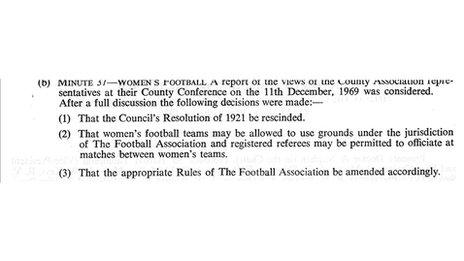
A year later the first women's FA Cup final was held and as the competition celebrates its 50 year anniversary season - and 100 years on from the controversial ban - BBC Sport speaks to female football legends on the evolution of the women's game.
'I'll never forget lifting the cup, that was my Wembley' - Lloyd
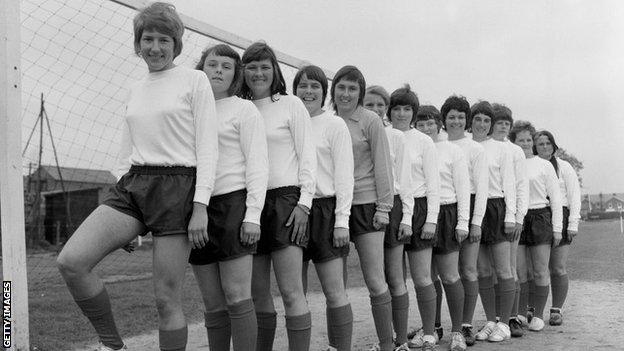
Southampton women, captained by Lesley Lloyd, won the first women's FA Cup in 1971
Lesley Lloyd captained Southampton to glory in the first Women's FA Cup final in 1971, beating Scottish side Stewarton & Thistle 4-1 at Crystal Palace National Sports Centre. The Saints went on to win eight of the next 11 cups.
What was it like playing football during that time?
"I used to have a cheese and pickle sandwich before I walked out on to the pitch. We just turned up and that was it. When we went back to the changing rooms after playing we used to have to wash our boots with a pipe. It was crazy! We had no facilities but we just played for the love of it. We loved the game.
What was it like playing during the ban?
"We were laughed at, to be quite honest. We used to hear about this ban and boys used to make fun of us for being women playing football, but in the end I think they could see that we were serious about it."
What do you remember about that first FA Cup final and lifting the trophy?
"I remember getting to the final. We arrived at the pitch and they had forgotten to cut the grass.
"I remember the manager saying to us it was the most important game we were ever going to play so to get out there and do something.
"There was a wooden hut full of supporters. I'll never forget lifting the cup. That was my Wembley. I know now what the ladies have is brilliant, but to us that was it.
"We didn't even take a photograph of the team until the following week. We washed all our kit and the photo was taken a week later, not on the day. It shows how much things have changed."
How do you feel now watching a women's cup final and seeing way the game has developed?
"I think it's brilliant - they have everything. It's great to see what there is now. Women should be entitled to exactly what the men have and I'd love to have been born in this era. But no matter what era you're playing in, the competitive spirit doesn't change.
"I've still got people that come up to me and talk about it now. I'm still a season ticket holder at Southampton and my whole family have been brought up on football. My children and grandchildren love watching women's football. I'm actually bringing my grandson to the final at Wembley. You never lose the love of the game."
'We'd get comments telling us to get married and have kids'
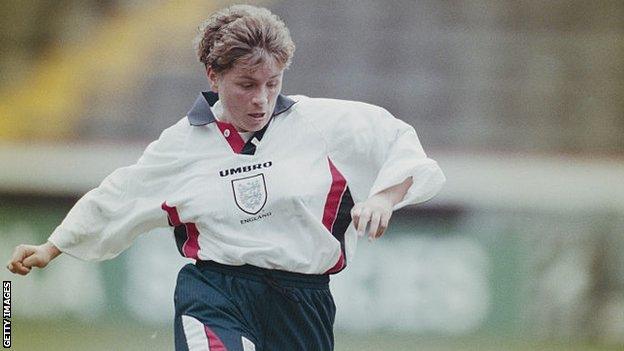
Former England captain Gill Coultard won the FA Cup six times with Doncaster Belles
Former England captain Gill Coultard had a 25-year playing career from the mid 70s until 2001, winning the FA Cup six times with Doncaster Belles. Having become the first woman to reach 100 England caps, England's first woman to score in a Wembley international and the first to score for England in a women's World Cup, in 2021 she was awarded an MBE for services to football.
What were some of the barriers that you had to overcome as a woman playing football?
"One of the biggest things that stands out for me will always be the comment that I'm a woman, I shouldn't be playing football and that I should be washing up at the sink.
"We'd get comments from the stands about getting married and having kids. That happened quite a lot during my time, especially when I first started. I couldn't get my head around it, I was only 13 and I was playing for Doncaster Belles when I kept hearing people saying this even as I got older and just thought, it's not right."
Have you seen attitudes change?
"They've definitely changed and I think that's because there's much more opportunity now for women and girls to play the game. There's more of a pathway. There are England teams at youth level which weren't there before and it's massively grown, which is where we should be today."
On the 50th anniversary of the women's FA Cup final, how do you feel about being a pioneer in the game?
"There were pioneers before me and we've all paved the way for the next generation. It's great to see the final be played at Wembley again. It's the home of football, it's where everyone wants to play and for the final to be played there, that's how much the women's game has evolved and hopefully that'll be how it is for the rest of my lifetime."
'We couldn't afford the bus to the stadium' - Bronze
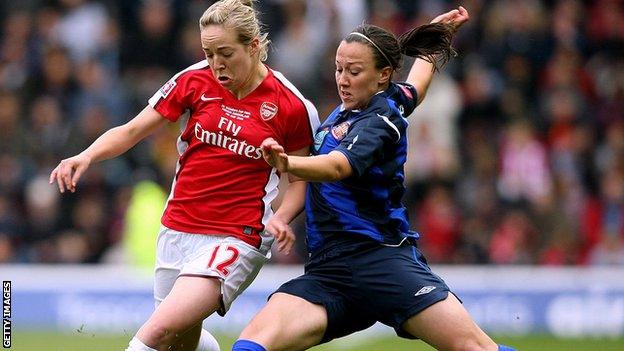
Manchester City and England defender Lucy Bronze (right) played in the 2009 FA Cup final between Arsenal and Sunderland
Manchester City and England defender Lucy Bronze is one of the most recognisable names in women's football today. Two-time FA Cup winner with City, Bronze's first FA Cup final came as a 17-year-old with third-tier Sunderland. In 2018 and 2020 she was named BBC Women's Footballer of the Year and in 2019 became the first English footballer to win the Uefa women's player of the year award.
Do you feel you've had to overcome barriers during your time as a professional footballer?
"I think I'm part of the generation in the middle. I remember being in the FA Cup final for Sunderland in 2009 against Arsenal. I was 17 years old at the time and we couldn't even afford the bus to the stadium.
"We had to bag pack in one of the supermarkets to raise money to pay for the bus. We didn't even have a warm-up kit for that game - we had to wear our old away shirt from the season before to warm up in."
How do you think the game has developed?
"In my first final when I was 17 I was a complete nobody - my own team-mates barely knew who I was let alone anyone else. Whereas in the 2017 final, it was off the back of the World Cup where people started to know who I was. The women's game was changing in England, the England international team was changing and that was a really big deal, especially with it being played at Wembley."
Did you ever think you'd be walking out at Wembley in an FA Cup final?
"I never thought we'd be playing at Wembley. It's a stadium with so much history, it's so well known and so many people have a connection to it. It's amazing to get to play there."
What more needs to be done to change attitudes towards women's football?
"It's easy to say that the growth has been good for the sport, because it has. I don't think any other sport has grown at the rate of women's football but that's not to say that we're where we need to be.
"We need to grow, we need to get more girls playing and playing to a higher level. We need more clubs to invest so it's not just a small group of clubs that people talk about winning things and we want to see a bit more competition. I think we need to grow the fanbases of women's clubs too. Personally, I think there is room for improvement in every single area.
"I've experienced both ends of the scale and I love it. It makes me appreciate things more but it also makes me want to fight and keep going and not settle."
How much further on could the game be without the ban all those years ago?
"When you look back at pictures before the ban came in, stadiums are more full then than they are now. It blows my mind to see stadiums that full watching women's football, but it just shows that at one time it was at that same level as the men's game.
"We're chasing after that ban because during that time men's football was constantly growing and women's wasn't. It's a tough task but everyone involved is pushing for it to get back to where it was."
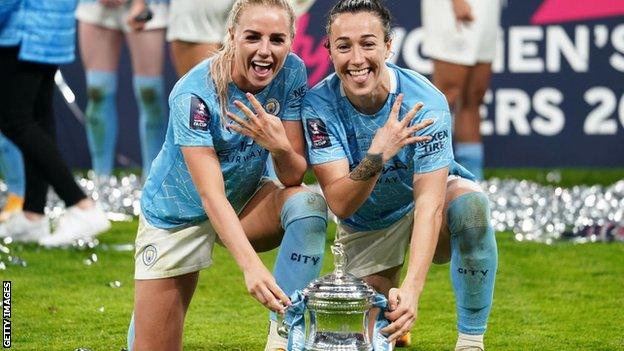
Bronze (right) won the FA Cup with Manchester City in 2020